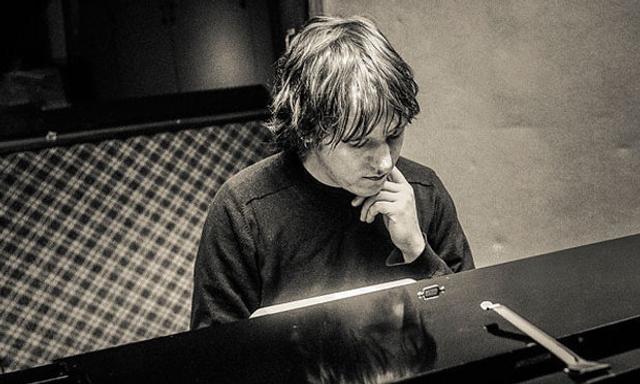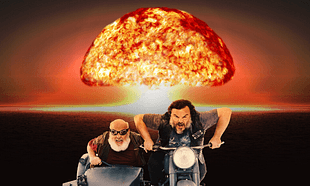It's been over ten years since the death of Elliott Smith but his legacy endures strongly to this day. In the second part of our exclusive interview with Elliott Smith biographer William Todd Schultz, author of Torment Saint: The Life of Elliott Smith, we examine Smith's uneasy trajectory towards fame, his reliance upon drugs and unravel some of the mysteries surrounding his untimely death.
Read part one of the interview here. | Buy 'Torment Saint: The Life of Elliott Smith of Amazon'
Words & Interview by Paul Page
For many, Elliott's appearance at the Oscars in 1998 performing 'Miss Misery' from the movie 'Good Will Hunting' was their first experience of his music. Do you think this marked a turning point in his life and contributed in any way to the difficulties he experienced afterwards? The additional pressure that came with this new found level of fame?
Fame is always a problem. There's no doubt Elliott wanted it. He wasn't indifferent. He wanted to hear his songs on the radio. He worked incredibly hard, and he didn't do that for no reason at all. It's not like what he envisioned was total obscurity. I think people sometimes present his attitude that way, but it's not accurate, at least not entirely. He wasn't this sort of goal-less person with zero aspiration, zero achievement motive. He was a tenacious song-maker. But he was introverted and shy, reluctant to trumpet his talents, self-doubting, self-diminishing.
So I feel like, in that respect, he was (like so many stars) temperamentally unsuited to being famous. It didn't fit him--a lot like the Prada outfit he wore at the Oscars. He hated cliche and persona, so he refused to play the part of the star. He was too honest. And it wigged him out when people approached him, asked for his autograph, treated him with extra preciousness. It was more weirdness to contend with, and he already had a lot of weirdness going on. Did fame destroy him? That would be too simple. I think what it did was magnify what was an already intense self-consciousness. And internally, it wasn't congruent with his own sense of self, which included a lot of feelings of worthlessness. It didn't jibe. The match was poor.
He flirted with the idea of taking heroin for a long time before succumbing. Once he did succumb, things began to unravel pretty quickly. You recount an incident where friends who obviously cared deeply for him attempted to stage an intervention and how this backfired badly. Do you think that in many ways he was always beyond help, and that there was nothing anyone could have done that would averted what was to follow?
No, I don't think that. Some reviewers have read my book that way, but it's not what I believe. I think he could have been helped. He could have been saved. It's not impossible. I've known hundreds of depressed, addicted, suicidal people over the years (my friend calls that combination of symptoms the "holy trinity" of mental illness), and they managed to move beyond, they got help, got clean, and got their shit at least partially together. Elliott could have done that too. He could have lived. But against his own best interests, he was adamantly opposed to inpatient treatment, something he very badly needed. And--and this sounds morbid--there was a part of him, growing bigger and bigger by the day, that simply wanted to die. Once people get to that point--in psychiatry it's called, legalistically, being a danger to yourself--it's hard to save them without sticking them in the hospital against their will.
The line from one of his most frighteningly brilliant songs 'Kings Crossing' where he sings 'I can't prepare for death anymore than I already have…. ' I remember hearing that when 'From A Basement On a Hill' was posthumously released and being stopped dead in my tracks. Absolutely chilling. Do you think there was always a determination there, a knowledge that it could only end one way?
He said, in the same song, "I've seen the movie, I know what happens." Also: "Give me one good reason not to do it." He was always attracted to the inevitability of things going disastrously south, even in the Portland years. What was good would somehow turn irreversibly bad. I think he got to the point where he saw how fucked up he was--he'd tell people "I'm so fucked up"--that he almost hoped for death as a form of oblivion, the final form. An end to the pain. The same thing heroin had been. Psychologists call this "psychache"--excruciating emotional turmoil. And it's the number one predictor of suicide.
In terms of his music, what do you consider his creative high point? The period or album when he was at the absolute peak of his powers?
That's tough. His powers just kept peaking and peaking. Personally, I adore Either/Or. It's got that intimacy, but also incredible range with songs like "Punch and Judy" and "Cupid's Trick," which I've really come to love. Also a few of his very best tunes: "Between the Bars," "Alameda," "Angeles."
But god, it's hard to argue with 'XO' too. So, so magnificent a record. Unbelievably realized and accomplished and musical. I have to say as well, had he lived I firmly believe "Basement" would have been an off the charts masterpiece. A new direction. A fuller palette. I guess if I were recommending a record to start with I'd say Either/Or. It's pretty quintessentially Elliott. But everyone has their own opinion on this. He was so good it's hard to choose. Sort of like the Beatles--what's better, Revolver, Rubber Soul, the White Album, etc?

Photo: JJ Gonson
The circumstances surrounding his death remain hugely contentious for some. There are those that still persist with the belief that he did not take his own life. This is largely based on the coroner recording a verdict that the mode of death was 'undetermined at this time'. The coroner listed 5 reasons why she came to that conclusion. Given your extensive research, are you satisfied that his death was unquestionably a suicide?
I do not believe his death is hugely contentious. I think the contentiousness is exaggerated by a handful of vociferous fans who create websites and message boards and propose often ridiculous, rambling theories that don't stand up to the mildest scrutiny. I interviewed the coroner--a wonderfully interesting person, Lisa Scheinin--at great length over many weeks. We discussed those five reasons in close detail, and what she ended up doing was drastically qualifying each one, as I spell out in the book. In the end I got the sense that even SHE didn't believe the reasons were all that compelling. And she stressed to me, in all caps, that her decision was NOT an indictment of the girlfriend who was with Elliott at the time, Jennifer Chiba.
At one of my book events in LA, I was approached by the fiercest of the murder theorists, a fan of Elliott's (though fan is the wrong word; she's less a fan of Elliott's, I feel, than a fan of the theory that Elliott was murdered). She hadn't read my book, as she admitted to me. Still, she hated it, completely without reason, as she never tired of announcing on her shrill websites. She kept repeating to me, "No one ever stabs themselves through clothing," as Elliott did. This is the quality of the thinking one encounters. It's sad and laughable and it would be funny if it weren't so destructive. True, stabbing through clothing is unusual. But so is driving off a cliff or falling from a tree. Yet those improbable things do occasionally happen. Unusual does not equal impossible.
I don't want to review all the facts here. That would take too much time. And I cover them exhaustively in the book. After taking into account the totality of the case and thinking through every possibility as deeply as anyone could, do I believe Elliott committed suicide; do I believe a reasonable person would conclude the same thing? Absolutely yes. Am I certain he did, unquestionably certain? Of course not. No one can be that. Do I believe, after interviewing her for over 30 hours, on the phone and in person, and trying to get a sense of her as an individual, that Jennifer Chiba was capable of killing Elliott Smith? No. I believe Chiba's therapist, who said the only person Jennifer would ever be capable of killing is herself.
His girlfriend at the time, Jennifer Chiba, has been the victim of a pretty vilifying smear campaign in the wake of his death. It is one of the saddest aspects of the whole situation that the person who looked after him and cared most about Elliott in his final years seems destined to have this cloud hanging over her for ever more. What were your impressions of her during your time researching the book?
I liked her. She's very smart, open, insightful, interesting, artistic. She's married to a super nice guy from the UK, she's moved on with her life. She works as a therapist. Every story she told me that could be checked against other accounts totally checked out. And I found her to be exceptionally frank, spontaneous in her answers, willing to disclose facts that came at her own expense sometimes. These people who devote their lives to detesting and accusing Jennifer Chiba, a person they've never met, are deranged. I hate to even talk about them because I know it only increases their ridiculous hatred of me too. But at a certain point these sorts of attacks need to be called out and named for what they are.
In fact, I appreciate your putting the question the way you did. True fans focus on the music, not the death, and definitely not on Chiba. It's fine when people decide they'd like to retain some uncertainty about what happened. That's maybe reasonable. But going beyond that and calling Jennifer Chiba a murderer is despicable. If I can, I'd like to say one other thing. Jennifer Chiba was not my main source for this book. Don't take that wrong, please. She was incredibly helpful and I'm grateful to her and always will be, but I talked to others--JJ Gonson, for instance, whose fabulous photos are all throughout the book--or Pete Krebs, or Tony Lash, who knew Elliott for a lot longer, and who provided quite a bit more material.
At the time of his death, Smith was clean of heroin and had been recording a lot of music that was going in a pretty extreme new direction. I know some of it appeared on the 'From a Basement …' album but is there a lot more material there that might see the light of day officially at some stage?
I hope so. It's up to the family, and they make all decisions 50/50. There are so many great songs still out there. I'm not sure what the reluctance is to release them. I'd do it in a second. I don't think Elliott would be opposed.
And finally, what do you consider to be the enduring legacy of Elliott Smith?
The songs. Always the songs, the music. That's Elliott Smith. And maybe also what he stood for: working your ass off, constantly perfecting your craft, and devoting yourself with all you have to the creation of true, lasting art. He's a model for artists. He's someone you can look up to and study as a craftsman. He shows what it takes to be really, truly exceptional. I had him in the back of my head always as I wrote and I tried living up to the standards he himself set for me.
Todd, thank you for taking the time to talk to entertainment.ie and good luck with the book. In your acknowledgements, you say you set out to make a book as beautiful as the music. A tough ask for anyone, but it comes pretty close.
That's incredibly kind of you to say and I'm very grateful.
(Photographs reproduced by kind permission of Marina Chavez and JJ Gonson)













































































